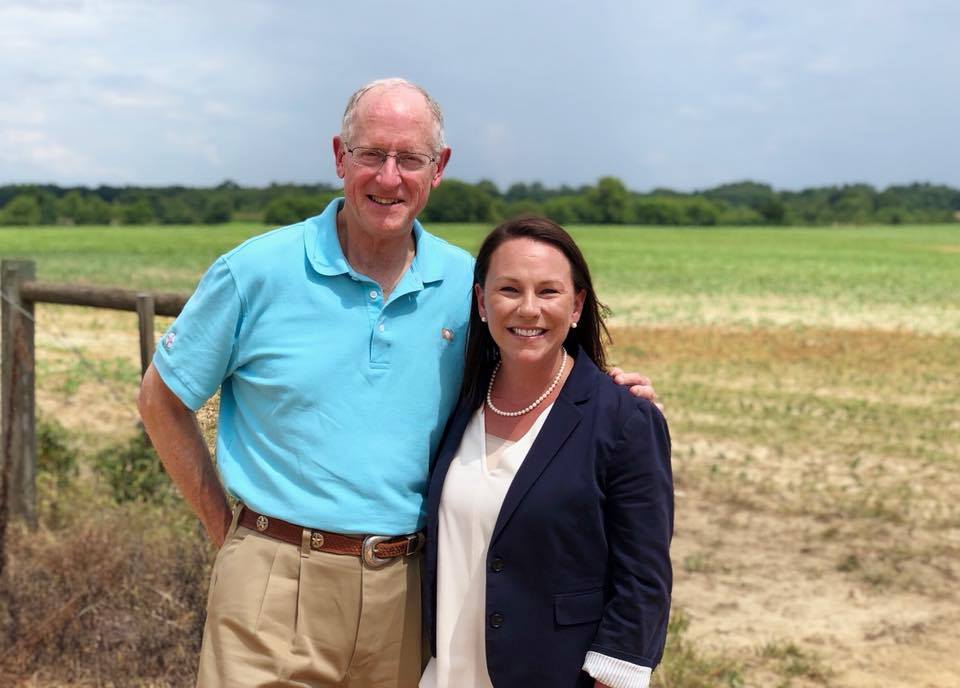Martha Roby: Touring southeast Alabama farms with Ag Chairman Mike Conaway

With Congress recently out of session for the Independence Day district work period, I took the opportunity to travel throughout Alabama’s Second District to share an update from Washington and hear directly from the people I represent. I spent time in Clayton, Eufaula, Andalusia, Montgomery, Troy, Slocomb, and Brundidge, just to name a few. Throughout my recent time on the road, one issue that came up frequently was agriculture policy, and I was glad to be able to share a timely update about the lay of the land as it relates to farm policy. During one day of this district work period, I had the privilege of hosting House Agriculture Committee Chairman Mike Conaway (R-TX) and his wife Suzanne for an agriculture tour of Alabama’s Second District. Together we held a large farmers’ roundtable discussion in conjunction with the Alabama Farmers Federation at the Pike County Cattlemen Association in Troy. This was a truly valuable opportunity for the farmers I represent to ask questions and get some answers. During the roundtable, we had conversations about the status of expanding access to rural broadband, possible solutions for our country’s feral hog problem, the importance of strict work requirements for welfare recipients, maintaining a strong crop insurance program, and more. After the roundtable, Chairman Conaway and I visited two family farms in Coffee and Geneva Counties for tours and briefings on their respective crops and operations. In Coffee County, we stopped by a beautiful farm that produces a variety of crops, including peanuts, cotton, and corn. In Geneva County, we visited a cotton farm that just recently planted a crop in early June. Chairman Conaway’s visit comes during a key time for agriculture policy in this country. As you may know, the House and Senate have passed our own different versions of the farm bill, and we will soon go to conference committee to work out the differences. In the House, we passed a conservative farm bill that includes strict work requirements for welfare recipients. I believe it’s important that we offer assistance to the most vulnerable Americans when they truly need it while providing tools to help them improve their circumstances. I have always said that we absolutely must encourage able-bodied individuals to work instead of incentivizing them to remain dependent on the federal government. The House farm bill reflects our conservative position on this issue, and I was proud to support it. Since the Senate is currently bound by a 60-vote threshold to pass legislation, their farm bill is considerably different than our version and doesn’t include conservative work requirements. When we go to conference to work through our differences, the bill that we ultimately pass will likely be a mixture of both versions. As I told the farmers in southeast Alabama, I am eager to continue working alongside my colleagues in Congress to get the work done and send a smart, strong farm bill to the President for his signature. I deeply appreciate Chairman Conaway and his wife Suzanne for making themselves available to the farmers I represent. We were able to have many one-on-one conversations with the hardworking men and women who are impacted by agriculture policy each and every day. I am also grateful to every farmer who attended the roundtable, asked meaningful questions, and hosted us on their properties. As Chairman Conaway said, “The decisions are made by the people who show up.” Thanks to the farmers who showed up, our day of agriculture policy discussion was very successful. I will continue to work alongside the Chairman and my colleagues to deliver agriculture policy that gives fair treatment to our Alabama commodities while making the farmers’ work easier, not more difficult. At the end of the day, my goal is for our farm bill to enable the farmers I represent to do the work they do best: provide the food and fiber that feeds our state, our country, and the world. ••• Martha Roby represents Alabama’s Second Congressional District. She lives in Montgomery, Alabama, with her husband Riley and their two children.
Business Council of Alabama CEO William Canary announces retirement, new job

After a tumultuous month of member company exits from the Business Council of Alabama (BCA), the organization’s President and CEO William Canary announced Friday afternoon he’s retiring in order to take a position with the U.S. Chamber of Commerce. According to a release from the BCA, Canary will become a senior fellow at the U.S. Chamber. “I am announcing today that I am retiring from my position as president and CEO of the Business Council of Alabama to pursue an opportunity as senior fellow at the U.S. Chamber of Commerce,” Canary said. “It has been my great privilege to lead the BCA these past 15 years. During my tenure, we have worked every day to make the BCA the most relevant and effective business advocacy association in Alabama. It has been an honor to work alongside men and women from all segments of Alabama’s economy, who invest hundreds and hundreds of hours of volunteer service to the BCA, for what is in the collective best interest of Alabama’s business community.” The move is not entirely unexpected as the Montgomery-based nonprofit issued a statement last month saying it would replace Canary no later than Jan. 1 after four of the state’s largest companies quit the organization. Alabama Power Co., Regions Bank, Blue Cross Blue Shield and PowerSouth Energy Cooperative all left the BCA in June. Until a new CEO is named, BCA Chief of Staff and Senior Vice President for Governmental Affairs Mark Colson will take over the day-to-day leadership of the organization.
State profiled in documentary about early childhood education

Across the country educational institutions and governments have tried to ensure every student has an equal opportunity to education and success. Most have relied on reaching students K-12, but the State of Alabama decided to put an even greater emphasis on early childhood education, recognizing children have the most potential for growth from pre-K to third grade. Last July the state launched a pilot program to help improve student success by aligning effective teaching strategies and improving collaboration among educators. “A strong start in the early years of a child’s education ensures a strong finish in their later educational endeavors. Whether a student will find success in school and the workforce is traditionally evidenced in their performance by third grade,” said Gov. Kay Ivey. Now, the state’s efforts are being featured in short-form documentary, “Starting at Zero: Reimagining Education in America,” which highlights the impact of early learning on future economic development in Alabama. The film premiered during the National Forum on Education Policy hosted by the Education Commission of the States (ECS) in Washington, D.C. Jeana Ross, Secretary of Early Childhood Education, presented on early childhood alignment from pre-k through third grade. “We know that investing in quality early learning impacts a child’s future far beyond the classroom,” said Governor Kay Ivey. “Alabama remains committed to ensuring the highest quality early learning experiences for our children, so that every child has access to the opportunities that prepare them for success in life.” This is an introduction to an upcoming full-length documentary featuring Alabama and the nation’s highest quality state-funded pre-kindergarten program, produced by the Saul Zaentz Charitable Foundation for the Saul Zaentz Early Education Initiative and the Harvard Graduate School of Education. Filmed in December 2017 at locations throughout the state including First Class Pre-K classrooms at Satsuma City Schools in Mobile County, F.S. Ervin Elementary in Wilcox County, Madison City Pre-K Center in Madison County, and the RSA Head Start in Montgomery, the film features interviews with Ivey, Secretary of Commerce Greg Canfield, and businessman Jeff Coleman. Every single one of the state’s 67 counties are served by First Class Pre-K, with more than 2,000 qualified pre-k teachers employed statewide and almost 20,000 students participating in First Class Pre-K and the new Pre-K – 3rd grade pilot program. “We are proud and excited to share our state’s success story with the country,” said Ross. “Alabama has built a nationally-recognized program of equity and quality, and we are committed to supporting these efforts to provide a deeper understanding of the value of investing in early childhood education.” Leading the nation For the past twelve consecutive years, Alabama has led the nation in quality while continuing to expand access to the voluntary, state-funded pre-kindergarten program from fewer than 2 percent to almost 30 percent of eligible four-year-olds statewide. According to research conducted by the University of Alabama at Birmingham and the Public Affairs Research Council of Alabama, students who participate in First Class Pre-K are more likely to be proficient in reading and math at every grade level. First Class Pre-K will officially break the 1,000-classroom-mark in the upcoming 2018-2019 school year and will serve more than 18,864 four-year-olds. Over the past 5 years, the Alabama Department of Early Childhood has overseen the largest expansion of the state’s voluntary First Class Pre-K program while maintaining the program’s nationally recognized quality standards.
Alabama Power puts focus on Birmingham’s smart city efforts for Innovation Week

Key players from the team responsible for Birmingham winning a 2018 Readiness Challenge Grant from the Smart Cities Council will discuss smart projects already underway during an Innovation Week event July 10 at Alabama Power Corporate Headquarters. “Think Next: How Birmingham’s Becoming a Smart City” will focus on plans to use digital technology to improve public safety, energy and transportation and how resources from the grant will accelerate efforts. Mashonda Taylor, chief Community Relations officer for the Woodlawn Foundation, will moderate the conversation. It will feature people who were instrumental in the Smart Cities Council grant process and who are closely involved in ongoing innovation efforts: Josh Carpenter, city of Birmingham director of Economic Development. John Smola, Alabama Power director of Business Transformation and Administration. Paula Alvarez Pino, University of Alabama at Birmingham program director of Sustainable Smart Cities Research. “We hope our session will spark conversation on how Birmingham is becoming a future-focused city by weaving in technological advances to improve the quality of life through cutting-edge services and connectivity,” Smola said. Session attendees can share ideas on how Birmingham can incorporate technology to make the city a better place to live and work while improving social equity and economic competitiveness. Before and after the session attendees can see a display of Alabama Power’s Smart Neighborhood™ project. Republished with permission from the Alabama NewsCenter.
Donald Trump weighs 2 or 3 candidates for court, to meet with Mike Pence

President Donald Trump is closing in on his choice to fill a Supreme Court vacancy created by Justice Anthony Kennedy’s retirement, telling reporters that he’s focused on two or three people ahead of his Monday announcement. “I think I have it down to four people. And I think of the four people I have it down to three or two,” Trump told reporters aboard Air Force One Thursday, as he traveled to a campaign rally in Montana. Trump was at his private golf club in New Jersey Friday and planned to spend the weekend there, consulting with advisers as he picks his court nominee amid intense jockeying from various factions seeking to influence the choice. The president planned to have dinner Friday night with Vice President Mike Pence, who has also been meeting with candidates as part of the vetting process. The president’s top contenders include federal appeals court judges Amy Coney Barrett, Brett Kavanaugh and Raymond Kethledge, with federal appeals court judge Thomas Hardiman still considered in the mix. As part of the roll-out process, the White House has been preparing information packages on all four, said two people familiar with the process who were not authorized to speak publicly. Starting from a list of 25 names vetted by conservative groups, Trump has also given serious consideration to federal appeals court judges Amul Thapar and Joan Larsen, and it’s possible the White House will prepare materials for more people. The president enjoyed the suspenseful process leading up to his announcement last year that he would nominate Justice Neil Gorsuch and is hoping to keep the guessing game going until he announces his pick Monday night. Trump’s social media director Dan Scavino tweeted Friday that the announcement would be at 9 p.m. from the East Room in the White House. Pence met in person with Kethledge and Barrett while he was vacationing in Indiana earlier this week and met with Kavanaugh at the Naval Observatory on July 4, said a person familiar with the process who was not authorized to speak publicly. Pence has also spoken to Republican senators, including Senate Majority Leader Mitch McConnell, Sen. Ted Cruz and Sen. Rand Paul about the process. As the president builds suspense for his second court pick in two years — a nominee who could tip the balance toward conservatives and revisit landmark rulings on abortion access, gay marriage and other issues — momentum is also growing among GOP supporters and detractors of the top contenders. Conservatives and some libertarian-leaning Republicans, including Paul of Kentucky, have raised concerns about Kavanaugh, warning he could disappoint Republicans if his past decisions are a guide. Paul and another Republican, Cruz of Texas, are supporting fellow Sen. Mike Lee, R-Utah, who is not said to be under serious consideration by the White House but is the only lawmaker Trump has considered for the position. To counter that, Kavanaugh’s allies have begun pushing back, reaching out to influential Republicans to ward off potential criticisms, according to one conservative who was the recipient of such outreach and spoke on condition of anonymity Thursday to discuss the situation. The senior administration official, though, said the administration is feeling less heat than earlier in this week over the choices, particularly Kavanaugh, and believes the jockeying in general has calmed somewhat. With the Senate narrowly divided, 51-49, in favor of Republicans, Trump’s announcement will launch a contentious confirmation process as Republicans seek to shift the court to the right and Democrats strive to block the effort. Any GOP defections could begin to doom a nominee. Senate Minority Leader Chuck Schumer, D-N.Y., told the president this week that nominating someone hostile to abortion access, or the 2010 health care law, would tarnish his legacy. Schumer told Trump that such a choice would be “cataclysmic” and create more division than the country has seen in years, according to a person familiar with the conversation who said Trump called Schumer on Tuesday. McConnell said Thursday at an event in Louisville he believes “the president will make a very high-quality appointment.” He acknowledged that his fellow Kentuckian, Judge Amul Thapar, is a finalist, but noted, “The competition at this level is pretty intense.” Trump conducted interviews Monday and Tuesday. Lee, R-Utah, is not viewed as a top prospect, but has consistent support among conservative and libertarian activists, including some Republicans who worry about a nominee not upholding their principles and who say the Utah senator could bring more certainty. Paul has told colleagues he may not vote for Kavanaugh if the judge is nominated, citing Kavanaugh’s role during President George W. Bush’s administration on cases involving executive privilege and the disclosure of documents to Congress, said a person familiar with Paul’s conversations who spoke on condition of anonymity. Some conservatives have pointed to Kethledge as a potential justice in the mold of Gorsuch. Both Kethledge and Gorsuch once served Kennedy as law clerks, as did Kavanaugh. Kethledge, a Michigan Law graduate, would add academic diversity to a court steeped in the Ivy League. Since Trump said his short list includes at least two women, speculation has focused on Barrett, a former law clerk to Justice Antonin Scalia and a longtime Notre Dame Law School professor who serves on the 7th U.S. Circuit Court of Appeals. Conservative groups rallied around Barrett after her confirmation hearing last year featured questioning from Democrats over how her Roman Catholic faith would affect her decisions. Trump’s choice to replace Kennedy — a swing vote on the nine-member court — has the potential to remake the court for a generation as part of precedent-shattering decisions. Recognizing the stakes, many Democrats have lined up in opposition to any Trump pick. Republished with the permission of the Associated Press.
City of Fairhope to vote on changing form of government

A non-profit group in Fairhope, Ala. has turned in enough signatures to create a special election, allowing Fairhope citizens to vote on whether or not they want to change the city’s current form of government. Probate Judge Tim Russell is still in the process of verifying the 857 signatures Fresh Start Fairhope garnered, the group only needed 685 John Hancock’s to be granted the referendum. The special election may be held as soon as September, but cannot be held later than 90 days after the petitions are validated. “I think we’re making a great case for a council manager system. I think when we get closer to actually having an election, we’ll have more opportunity to explain the benefits of that system and our message will continue to get stronger,” Fresh Start Fairhope leader Chuck Zunk told WPMI. The new form of government they are proposing would create a new governing body known as the “Council of the City of Fairhope,” which would have the same executive powers and duties of the council, but would make the mayor a member of the council, not an executive over it. Meaning they would no longer be over all city employees, or the council. The mayor would also be in charge of ceremonial events, and serve as a representative of the city. The way the members of the council are elected would also change, “One member will be a council member elected by the voters at large. Three members will be council members elected by the voters from each of three single-member districts,” the group states. Fairhope’s mayor Karin Wilson issued her own petition supporting the Council-Manager form of government, because it “takes the day-to-day administrative role out of the political limelight which has been very detrimental to not only our City but others also still operating under the Council-Mayor form of government.” Her version of the petition failed to meet the necessary amount of signatures to be considered by the probate court. Wilson under fire Wilson has been under fire from the City Council repeatedly this year. In March, Wilson received an email from Fairhope Police Chief Joseph Petties, after a controversial hiring decision she made in February without the council, or police chief’s approval, later retracting the hire. Wilson again came under fire in May with Fairhope’s Financial Advisory Committee (FAC), after sending an e-mail to committee chairman Chuck Zunk telling him the city budget was ultimately her responsibility, and that she would let the committee know if and when she needed their input. Earlier in June, Petties announced his retirement at a city council meeting after saying Wilson bullied him and made false accusations against him. In an unanticipated turn of events, council members emphatically tore up Petties’s resignation letter, refusing to accept his resignation. They said they would look into whether or not the council could pursue efforts to pry police supervisory power from Wilson.
Women of Influence: Alabama Ronald McDonald House CEO Katherine Billmeier

Few women in the world have had as much of an impact on their city’s space as Katherine Billmeier. A member of the Birmingham, Ala. community since birth, Billmeier graduated from Mountain Brook High School and attended Mount Vernon College, now under the name George Washington University in Washington D.C., earning her bachelors degree in Arts & Humanities in 1987. She then pursued and earned a post-graduate certificate in fine and decorative art at Sotheby’s Institute of Art in London. Although her background is in art, Billmeier found her true passion in the non-profit sector; serving for nearly two decades in non-profits in Birmingham — literally shaping her community along the way. She began serving as the Executive Director of Birmingham’s Vulcan Park in 2000 during the icon’s $20 million capital campaign to restore the Vulcan statue and the park surrounding it. She also co-edited the Vulcan Park: Celebrating 100 years of Birmingham’s Colossal Icon book. She left the park in 2004, and began her work with Ronald McDonald House Charities of Alabama (RMHCA) where she served as Capital Campaign Counsel before the $7.5 million house was completed in 2007. In 2008, she became a Board member serving until January of 2012 when the non-profit named her Executive Director. “What we do is provide a home away from home for families whose children are being treated at area hospitals. It’s so much more, though. Our families find other voices and other bodies going through similar situations. They’re able to lean on each other, support each other, pray with each other and help each other,” Billmeier told the Alabama Newscenter. “We achieve our mission by providing a fabulous room for families to sleep in, and just being there with a smile and hug,” Billmeier continued. “Our families come from all over the state of Alabama, and the world, actually. Children’s of Alabama is the third-largest children’s hospital in the nation and continues to grow, and we will continue to grow to meet that need.” RMHCA’s first CEO leads around town Billmier demonstrated so much passion, and achieved so much success at the RMHCA, they named her their first ever Chief Executive Officer in February of 2016 where she still serves today. But her involvement in her community doesn’t stop there. Throughout her time at the RMHCA, Billmier served as a non-profit consultant to several other groups, specializing in development and project management. She was responsible for the board development and project management of the $16.5 million Railroad Park. Completed in 2010, the park has become an award-winning staple and hub of activity in the Birmingham community. “Railroad Park has become and indeed exceeded the reality that so many dreamed it would be,” Billmeier wrote to The Birmingham News. “City and business leaders, teachers and students, residents and designers — people with vision came together and took a risk, ignored the naysayers, and built a beautiful urban park for the long term good of the community.” In her letter to what was then The Birmingham News, Billmeier predicted new developments along First Avenue South, an area which, since the park opened, has been revitalized and is now teeming with businesses, breweries, coffee shops, and apartment buildings. Billmeier is a woman who knows how to grow and develop, not just families in need of support, but whole communities. For her service to Alabama families dealing with their children’s health issues, her astounding work to revitalize critical Birmingham parks and neighborhoods Katherine Billmeier is absolutely an Alabama woman of influence.
2018 runoff election ad round-up: July 6 edition

The July 17 runoff election is only 11 days away and Alabama’s candidates have taken to the internet and the airwaves with campaign ads in hopes of swaying Yellowhammer State voters to their side. In the past week, Republican Lieutenant Governor candidates Twinkle Andress Cavanaugh and Will Ainsworth have been at one another’s throats while other runoff candidates, like Judge Michelle Thomason have focused their ads on their own merits. Martha Roby joined in the frenzy; going after runoff opponent Bobby Bright in her new campaign ad. Lieutenant Governor Twinkle Andress Cavanaugh: Title: Giving Back Published: June 25, 2018 Tone: Conciliatory Title: The Real Con Artist Published: June 28, 2018 Tone: Derisive Title: Governor Mike Huckabee Endorses Twinkle for Lt. Governor Published: July 2, 2018 Tone: Indignant Will Ainsworth: Title: Up There Published: June 27, 2018 Tone: Playful Civil Appeals Court: Place 1 Michelle Thomason: Title: Judge Thomason and the Veteran’s Court Published: July 5, 2018 Tone: Sympathetic Title: Judge Michelle Thomason for Our Families Published: July 5, 2018 Tone: Virtuous U.S. Congressional District 2 Martha Roby: Title: Clear Published: June 21, 2018 Tone: Aggressive
Mobile, Montgomery among top 40 US cities Americans are abandoning fastest

24/7 Wall Street, a financial news and commentary Web site, released a new report on Thursday identifying the 50 cities Americans are abandoning the fastest. In the “Population migration patterns” report, two Alabama cities made the top 40; Montgomery ranked #27 and Mobile ranked #39. According to the report, “Each year, roughly 40 million Americans, or about 14% of the U.S. population, move at least once. Much of that movement includes younger people relocating within cities, but it is trends of Americans moving to warmer climates, more affordable areas, and better job opportunities that have largely determined migration patterns in recent decades.” The study used migration data from the U.S. Census Bureau from 2010 to 2017 to come up with the list. During those years Montgomery’s population decreased 10,317 to migrating residents, meanwhile Mobile lost 8,517. However, despite its migration loss, Mobile set a net 0.2 percent population gain during those years. Montgomery however, lost 0.2. percent of its overall population. A look at the stats Montgomery, Ala. Population decrease due to migration, 2010-2017: -10,317 Population change, 2010-2017: -0.2% (374,541 to 373,903) Natural growth, 2010-2017: 35,032 births, 25,380 deaths Median home value: $135,700 Mobile, Ala. Population decrease due to migration, 2010-2017: -8,517 Population change, 2010-2017: +0.2% (413,143 to 413,955) Natural growth, 2010-2017: 40,422 births, 30,886 deaths Median home value: $126,800
Personnel note: Martha Roby promotes Mike Albares, Lori Ward Williams

Alabama 1st District U.S. Rep. Martha Roby on Friday announced staff promotions in her Washington, D.C., and Montgomery offices. Roby’s Legislative Director, Mike Albares of Dothan, has been promoted to Deputy Chief of Staff. He will continue to lead Roby’s legislative team, overseeing her work on the House Appropriations Committee and the House Judiciary Committee as well handling agriculture issues. Representative Roby’s Field Representative for the Montgomery area, Lori Ward Williams of Prattville, has been named District Director. She is based out of the Montgomery district office and replaces Joe Williams who served in this role for many years. Roby congratulated Albares and Wilson and expressed gratitude for Joe’s many years of dedicated service. “Mike Albares and Lori Williams are invaluable assets to my office, and they have worked very hard on behalf of Alabama’s Second District. I have appreciated their dedication over the years, and I am proud to see them advance in these new roles as they continue to be key members of my staff,” Roby said in a statement. “Joe Williams has worked in service to Alabama’s Second District for several decades, and I cannot emphasize enough how valuable his work has been to the people I am fortunate to represent. My office is incredibly proud for his new opportunity with the Alabama Community College System. I am thankful to have had Joe as a member of my staff for so many years, and I am grateful to call him a dear friend. I wish him the very best in his new endeavor.”
Scott Pruitt is out, handing EPA reins to former coal lobbyist

Bowing out after months of scandals, Scott Pruitt is turning the Environmental Protection Agency over to a far less flashy deputy who is expected to continue Pruitt’s rule-cutting, business-friendly ways as steward of the country’s environment. With Pruitt’s departure, President Donald Trump lost an administrator many conservatives regarded as one of the more effective members of his Cabinet. But Pruitt had also been dogged for months by scandals that spawned more than a dozen federal and congressional investigations. EPA Deputy Administrator Andrew Wheeler, a former coal industry lobbyist, will take the helm as acting administrator starting Monday. “I have no doubt that Andy will continue on with our great and lasting EPA agenda,” Trump tweeted Thursday in announcing Pruitt’s resignation. Republicans say Wheeler is well-qualified to lead the EPA, having worked at the agency early in his career. He also was a top aide at the Senate Environment Committee before becoming a lobbyist nine years ago. Democrats and environmental groups decried Wheeler as an apologist for the coal industry. He’s also a former top aide to GOP Sen. James Inhofe of Oklahoma, who rejects mainstream climate science. Sen. Tom Udall of New Mexico, one of the most relentless and vocal of Pruitt’s Democratic critics in Congress, said he expects more of the same with Wheeler as chief. “Somebody that destructive, I think it’s good to have them go, no doubt about it,” Udall said of Pruitt in an interview. “But let’s not forget he was carrying out President Trump’s policies.” The prospect of more EPA rollbacks even after Pruitt is gone is “really, really worrisome to me,” he said. “The head of the agency’s changed, but I don’t think there’s any indication that the acting administrator will do anything any different.” Talking to reporters on Air Force One, Trump continued to praise his scandal-plagued EPA chief, saying there was “no final straw” and he had not asked for Pruitt’s resignation. “Scott is a terrific guy,” Trump said. “He came to me and said I have such great confidence in the administration I don’t want to be a distraction. … He’ll go and do great things and have a wonderful life, I hope.” In his resignation letter to Trump, obtained by The Associated Press, Pruitt expressed no regrets. “It is extremely difficult for me to cease serving you in this role first because I count it a blessing to be serving you in any capacity, but also, because of the transformative work that is occurring,” Pruitt wrote. “However, the unrelenting attacks on me personally, my family, are unprecedented and have taken a sizable toll on all of us.” Pruitt, a Republican, had appeared Wednesday at a White House picnic for Independence Day, wearing a red-checked shirt and loafers with gold trim. Trump gave him and other officials a brief shout-out, offering no sign of any immediate change in his job. Pruitt’s resignation came days after two of his closest advisers spoke to House oversight committee investigators and revealed new, embarrassing details in ethics scandals involving Pruitt. Samantha Dravis, who recently resigned as Pruitt’s policy chief, told investigators last week that Pruitt had made clear to her before and after he became EPA administrator that he would like the attorney general’s job, held then and now by Jeff Sessions. Pruitt “had hinted at that (sic) some sort of conversation had taken place between he and the president,” Dravis told congressional investigators, according to a transcript obtained Thursday by the AP. “That was the position he was originally interested in.” A former Oklahoma attorney general close to the oil and gas industry, Pruitt had filed more than a dozen lawsuits against the agency he was picked to lead. Arriving in Washington, he worked relentlessly to dismantle Obama-era environmental regulations that aimed to reduce toxic pollution and planet-warming carbon emissions. During his less than two-year tenure, Pruitt crisscrossed the country at taxpayer expense to speak with industry groups and hobnob with GOP donors, but he showed little interest in listening to advocates he derided as “the environmental left.” Those groups quickly applauded his departure. “Despite his brief tenure, Pruitt was the worst EPA chief in history,” said Kieran Suckling, executive director of the Center for Biological Diversity. “His corruption was his downfall, but his pro-polluter policies will have our kids breathing dirtier air long after his many scandals are forgotten.” Like Trump, Pruitt voiced skepticism about mainstream climate science and was a fierce critic of the Paris climate agreement. The president cheered his EPA chief’s moves to boost fossil fuel production and roll back regulations opposed by corporate interests. But despite boasts of slashing red tape and promoting job creation, Pruitt had a mixed record of producing real-world results. Many of the EPA regulations Pruitt scraped or delayed had not yet taken effect, and the tens of thousands of lost coal mining jobs the president pledged to bring back never materialized. Pruitt quit following a series of revelations involving pricey trips with first-class airline seats and unusual security spending, including a $43,000 soundproof booth for making private phone calls. He also demanded 24-hour-a-day protection from armed officers, resulting in a swollen 20-member security detail that blew through overtime budgets and racked up expenses of more than $3 million. Pruitt routinely ordered his EPA staff to do personal chores for him, including picking up his dry cleaning and trying to obtain a used Trump hotel mattress for his apartment. He had also enlisted his staff to contact conservative groups and companies to find a lucrative job for his unemployed wife, including emails seeking a Chick-fil-A franchise from a senior executive at the fast-food chain. Pruitt’s job had appeared in jeopardy since the end of March, when ABC News first reported that he leased a Capitol Hill condo last year for just $50 a night. It was co-owned by the wife of a veteran fossil fuels lobbyist whose firm had sought regulatory rollbacks from EPA. The slew of damaging revelations, many of which came to
Huntsville prepares for 2018 municipal election

The countdown is under way for the upcoming City of Huntsville municipal election on Aug. 28. Three City Council and School Board positions are up for a vote in Districts 2, 3, and 4. Qualification for candidates opened at 8 a.m. on Tuesday, July 3, and ends at 5 p.m. on Tuesday, July 17. Individuals interested in running for elected office must declare their intent with the City Clerk Treasurer during this two-week period. Dates of importance There are several dates before the municipal election that voters should note: July 17: Deadline for voter registration or change of address. Aug. 23: Deadline to apply for absentee ballots. Aug. 27: All absentee ballots are due. Aug. 28: Election Day.


